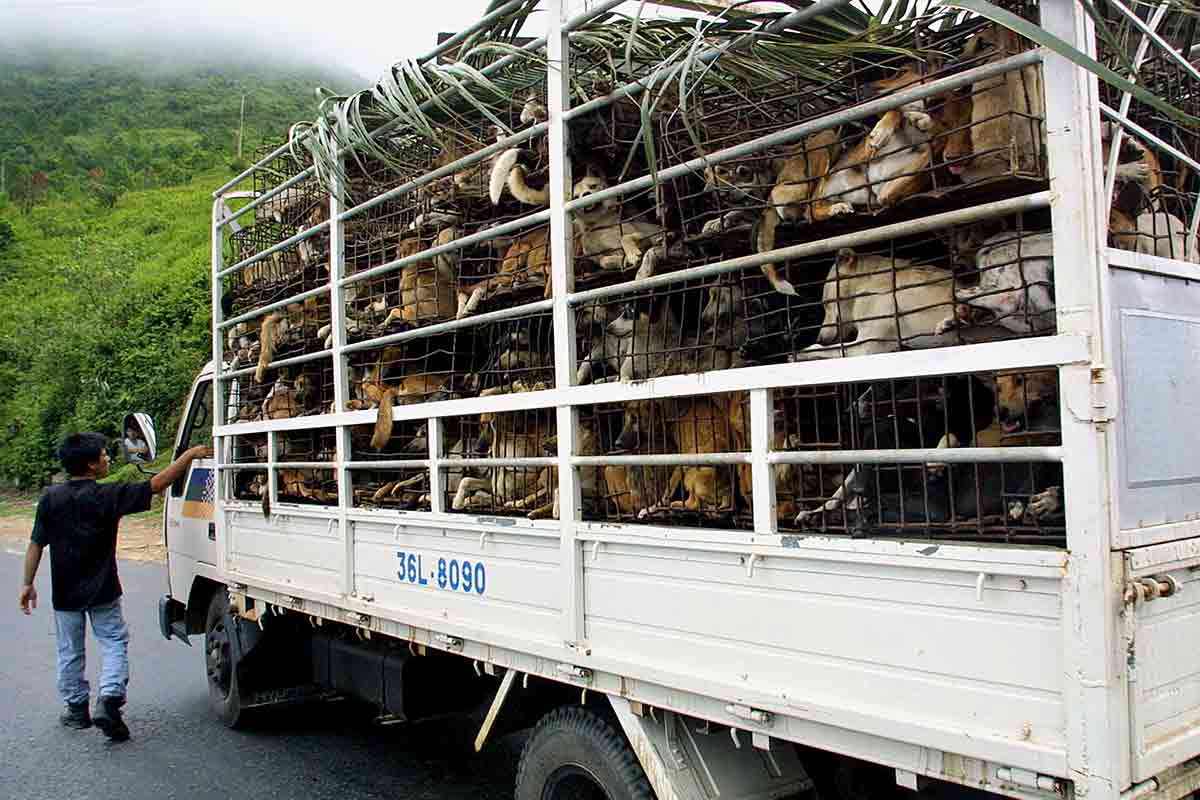Dog meat may not be as exotic as the fugu fish but it can be just as deadly. The risk of rabies and other communicable diseases, such as cholera and trichinellosis, has prompted the Indonesian government to put a stop to the trade in dog and cat meat.
Indonesia’s directorate of veterinary public health under the Agriculture Ministry initiated a meeting with the Dog Meat-Free Indonesia (DMFI) coalition in early August to discuss the dog and cat meat trade. The coalition comprises Humane Society International (HSI), Four Paws, Jakarta Animal Aid Network, Animal Friends Jogja and Change for Animals Foundation (CFAF).
The director of veterinary public health, Syamsul Ma’arif, said the dog meat trade poses a serious public health threat. Human rabies is still endemic in 24 out of 33 provinces in Indonesia.
In May, the DMFI reported that it found a rabies-infected dog carcass being sold for human consumption at the Tomohon Market in North Sulawesi. A recent study on markets in North Sulawesi found that between 7.8 and 10.6 percent of dogs sold as food were infected with rabies.
DMFI’s spokeswoman and CFAF co-founder, Lola Webber said there are over 200 markets selling dog and cat meat in North Sulawesi alone.
“The scale of the problem is potentially catastrophic for Indonesia’s attempts to eliminate rabies and gravely jeopardises the health and safety of its citizens and animals,” she said.
There are no dog farms in Indonesia and supply often comes from captured strays or stolen house pets. Jakarta Animal Aid Network, a member of the DMFI, said it receives numerous reports every week from pet owners whose dogs are stolen by armed thieves. The dogs are bound, gagged and crammed into trucks to be shipped to the markets.
Ma’arif acknowledged the dog trade as “torture for animals” and that cruelty to animals can hurt the tourism industry.
“The extreme cruelty of Indonesia’s dog and cat meat trades is intolerable under both Indonesian and international animal welfare standards. The government is right to be concerned about the impact of these trades on its international reputation,” said Webber.
Dog meat is considered haram or ritually unclean by Muslims. Nonetheless, in Muslim-majority Indonesia, it is still sold as food. Rica-rica is a spicy dog meat dish from North Sulawesi. The Batak tribe in northern Sumatra also considers dog meat as food. Between 60,000 to 70,000 dogs are killed and eaten in Bali every year, said the Bali Animal Welfare Association. It also reported that tourists have unknowingly been served dog meat at some food stalls.
No date was given on when the dog meat trade ban would be instituted. Once in place, Indonesia will join fellow ASEAN members, the Philippines, Thailand and Singapore in banning the dog meat trade for disease control and animal welfare reasons.

Source: Various
Thriving trade
The consumption of dog meat is still practiced in countries like China, South Korea and Vietnam. The HSI has estimated that some 30 million dogs are killed each year for human consumption with the trade more prevalent in these countries as well as in the Philippines, Thailand, Lao PDR and Cambodia.
Dog meat has been consumed in China for over 4,000 years. It is believed to relieve “heatiness” especially in the hot summer months. In 2009, the city of Yulin decided to institutionalise it by organising an annual Lychee and Dog Meat Festival to celebrate the summer solstice. Some 10,000 to 15,000 dogs are killed and consumed each year at the festival. In 2017, more than 1,300 dogs were rescued when a truck was stopped and the police discovered a majority of the canines were stolen and 40 percent of them carried infectious diseases.
South Koreans also consume dog meat during the hottest days of summer. The Korean Animal Rights Advocates estimates that some 780,000 to one million dogs are eaten each year in South Korea. It says there are approximately 3,000 dog meat farms operating across the country. Some of the dogs are excess puppies bred for the pet industry.
The primary dog breed used for meat in South Korea is the Nureongi but local media there reported that many different breeds are reared for meat as well, with some owners even slaughtering their pets for consumption.
Meetings have been held in the recent past between the Asia Canine Protection Alliance (ACPA) and high-level officials from Thailand, Cambodia, Lao PDR and Vietnam in Hanoi to discuss the spread of rabies through the consumption of dog meat. The countries agreed to a five-year moratorium on the cross-border trade of dogs for human consumption. Thailand, which has already banned such trade, agreed to enforce its regulations better.
“While the dog meat trade is not illegal in Vietnam, Lao PDR and Cambodia, the international trade in dogs is illegal if health and vaccination documents cannot be provided for each dog,” said Tuan Bendixsen, Vietnam director, Animals Asia.
“As the trade involves hundreds of dogs in each transport, it is impossible to have proper documentation for all the dogs concerned, or have them properly checked before a border crossing. This trade must be stopped,” he added.
